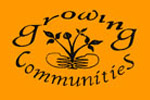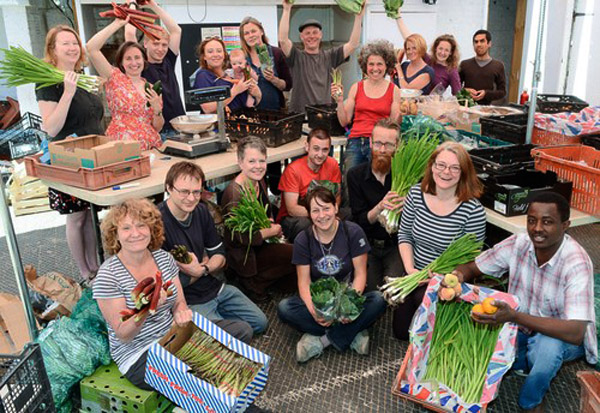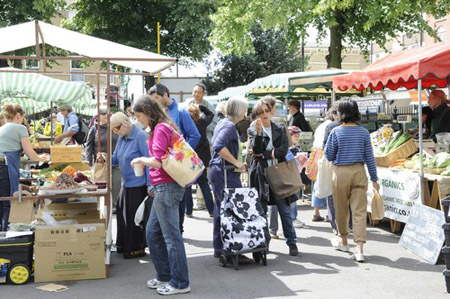 Case study of Growing Communities, which is a community-led food trading enterprise based in Hackney, North London that was set up to provide a viable alternative to the damaging mainstream food system. Social and environmental principles are built in to everything they do, so they can confidently state they have reduced food waste almost to zero.
Case study of Growing Communities, which is a community-led food trading enterprise based in Hackney, North London that was set up to provide a viable alternative to the damaging mainstream food system. Social and environmental principles are built in to everything they do, so they can confidently state they have reduced food waste almost to zero.
Growing Communities: background and core values
Over the past 20 years, Growing Communities has created two main community-led trading outlets - an organic fruit and vegetable box scheme serving well over 900 households every week, and the award-winning Stoke Newington Farmers' Market, which provides a regular trading outlet to 23 small-scale food producers. These harness the collective buying power of the community and direct it towards those farmers who are producing food in a sustainable way, to help them thrive.

Growing Communities also runs organically-certified urban market gardens, where they grow produce for sale through the box scheme. These ultra-local urban growing sites provide training for apprentice growers and volunteers, some of whom are now helping to create a Patchwork Farm in Hackney, growing food for the box scheme in back gardens, on church land and on estates.
Growing Communities is now running a Start-up Programme to help other groups in London and across the UK to set up community-led box schemes. Two of the local groups in London are pictured below - who are working to the Growing Communities model and principles, and hence are inherently low-waste enterprises. To find out more, visit: www.growingcommunities.org/about-us/start-up-programme/

How the Growing Communities box scheme minimises waste
All Growing Communities customers are members of the trading scheme and pay up-front, opting for a bag size and type that will meet their household needs. The content of each type of bag is decided by Growing Communities based on value and seasonal availability. As well as reducing food waste, this means that Growing Communities can place reliable orders with small-scale organic farmers that make deliveries efficient and worthwhile.
If customers prefer not to take home a particular item in the bag, then they can put it into a ‘swap box’ at the pick-up points. In return, they can take a different item left by somebody else.
Importantly, fruit and vegetable bag customers also receive a weekly newsletter, which shares news, provides recipes and reinforces the social and environmental values of the scheme. In turn, this helps customers to value their food, and to waste less at home.
Any food that is left over is put out in crates for visiting customers to take, free of charge, when they come to collect their bags from the pick-up points. Uncollected bags are donated to community cooking projects such as People’s Kitchen, Urban Table and North London Action for the Homeless.
"I cook for North London Action for the Homeless. With the help of volunteers we provide free meals to anyone who needs them in the community. Using Growing Communities’ leftover veg not only saves us a lot of money but it enables us to prepare really healthy meals."
Lucie Galand, North London Action for the Homeless
Finally, a very small amount of fruit and vegetables is unavoidably left over, which may be damaged or inedible. This is composted, to return good nutrients to the Hackney market-garden soil.
How the Growing Communities Stoke Newington farmers’ market minimises waste
At the weekly Stoke Newington farmers’ market, fresh fruit and vegetables are displayed on traditional stalls and customers can buy as much or as little as they need, and take it home in a paper bag. Because the farmers themselves sell the food, they are also available to talk about the quality of the produce and to suggest how they can be stored and cooked.
 When it comes to meat and fish, some plastic packaging is inevitable for hygiene reasons, but again this can be kept to a minimum because the direct sale means that the produce is handled very little. The Stoke Newington farmers’ market meat stall also sells offal, encouraging use of the whole animal. It is common to hear customers around the meat stall to be discussing recipes and the relative merits of eating heart, tongue and cheek.
When it comes to meat and fish, some plastic packaging is inevitable for hygiene reasons, but again this can be kept to a minimum because the direct sale means that the produce is handled very little. The Stoke Newington farmers’ market meat stall also sells offal, encouraging use of the whole animal. It is common to hear customers around the meat stall to be discussing recipes and the relative merits of eating heart, tongue and cheek.
The people running the fish stall work with small day boats that fish off the South Coast to bring their catch to market. As specialists and enthusiasts, they are able to advise customers on the quality and cooking methods for varieties of fish that would otherwise go to waste due to being discarded at sea, or ignored by most customers due to a lack of familiarity.
As a matter of principle, Growing Communities chooses to work with organic farmers and food growers operating as close to the community as possible. By pooling the purchasing power of the community, Growing Communities helps to make delivery journeys more infrequent and efficient, helping to reduce transportation waste and fuel use. In the trading year April 2012 to April 2013 the percentage of box scheme veg that were UK-grown was 85% (compared to a UK average of 55% and the percentage of box scheme fruit that was UK-grown was 29.4% (compared to a UK average of 10%). These are impressive achievements for a community-led trading scheme, that is pioneering a more sustainable approach to providing good food on which we all depend.
Contact: Growing Communities, The Old Fire Station, 61 Leswin Road, London N16 7NX. Tel: 020 7502 7588. Website: www.growingcommunities.org. Email: growcomm@growingcommunities.org. Twitter: @growcomm
This case study has been prepared by Sustain: The alliance for better food and farming, as part of the FoodSave project, helping small- and medium-sized enterprises to reduce food waste. If you run a small food business in London and want help reducing your food waste, please get in touch. Email:charlotte@sustainweb.org; tel: 0203 5596 777; web: www.sustainweb.org/foodsave/

FoodSave is funded by the European Regional Development Fund (ERDF), the London Waste and Recycling Board (LWARB) and the Mayor of London, co-ordinated by the Greater London Authority (GLA) and supported by the London Food Board.
Food Waste: Sustain supports a reduction in food surplus, loss and waste.
